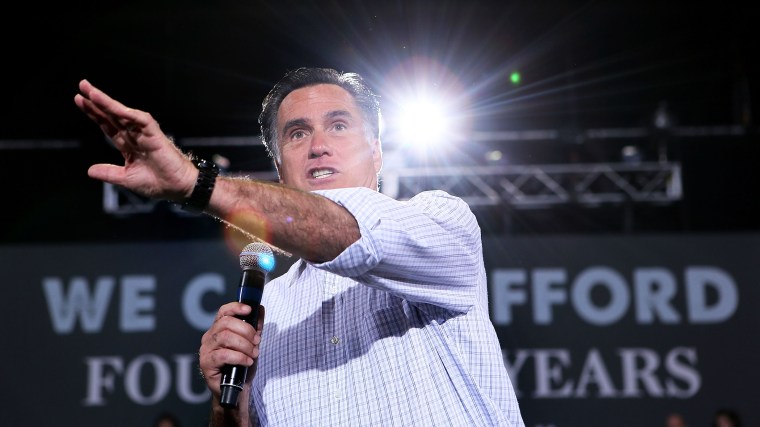Mitt Romney likes to write the occasional op-ed, usually on topics he doesn't understand especially well. Last fall, for example, the former one-term governor with no military experience wrote a Washington Post piece on his vision for overhauling the U.S. armed forces. Earlier this year, USA Today published a piece from Romney condemning an international nuclear agreement with Iran.
And this week, for anyone thinking, "If only we had Mitt Romney around to help us navigate these challenging waters regarding ISIS," there's good news: the failed presidential hopeful has a new piece in the Washington Post on the lessons of Paris and how to "wage war" against ISIS.
On Friday morning, hours before news broke that terrorists killed 129 people and wounded hundreds of other innocent victims in coordinated, bloody attacks all around Paris, President Obama told Americans that “we have contained” the advance of the Islamic State. Now that the Islamic State is claiming credit for these attacks, we know just how wrong he was. After Paris, it’s clear: Doing the minimum won’t make us safe. It’s time the president stopped hedging and took meaningful steps to defend us and our allies.
Right off the bat, it's pretty obvious Romney has no idea what he's talking about. Obama wasn't wrong about containing ISIS's territorial gains; he was entirely correct. It's not particularly complicated.
What's more, it's not clear how Romney defines "hedging." Obama has launched over 6,000 airstrikes against ISIS targets -- roughly quadruple the number of the rest of the world combined -- as part of a sustained, ongoing campaign that started 15 months ago. Why is this an example of presidential "hedging"? I have no idea; Romney didn't say.
Nevertheless, Romney says he has a plan: (1) start using words like "Islamists," because nothing undermines terrorism more than conservative semantics; (2) the White House can "call in the best military minds from the United States and NATO"; (3) Middle Eastern countries should engage in some kind of p.r. campaign to "promote tolerance and eschew violence"; (4) block ISIS's victims from seeking refuge in the United States, unless they're old, young, or women.
The piece concludes, "We must do what it takes." Oh, good. What would we do without Mitt Romney bringing such clarity to complex national-security dynamics?
And just to reiterate a point from last year, it's important to appreciate the fact that Romney is claiming credibility on a subject he knows very little about. Indeed, looking back at 2012, let’s not forget that Romney’s own advisers said “they have engaged with him so little on issues of national security that they are uncertain what camp he would fall into, and are uncertain themselves about how he would govern.”
On the Middle East peace process, Romney said he intended to ”kick the ball down the field and hope” that someone else figures something out. His handling of the crisis in Libya “revealed him as completely craven.” On Iran, Romney and his aides couldn’t even agree on one policy position. On Afghanistan, Romney occasionally forgot about the war.
Remember the time Romney “fled down a hallway and escaped up an escalator” to avoid a reporter asking his position on the NATO mission in Libya? Or how about the time he said there are “insurgents” in Iran? Or when he flip-flopped on Iraq? Or when he looked ridiculous during the incident involving Chinese dissident Chen Guangcheng?
Thomas Friedman noted shortly before the election, “For the first time in a long, long time, a Democrat is running for president and has the clear advantage on national security policy.” Part of this, the columnist argued, is that Mitt Romney acts “as if he learned his foreign policy at the International House of Pancakes.”
And yet, despite all of this, Romney presents himself as an authority on foreign policy. Unbelievable.
